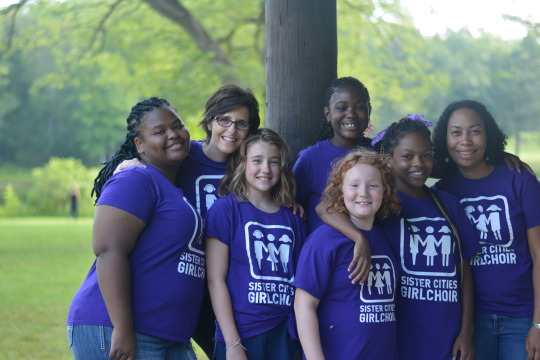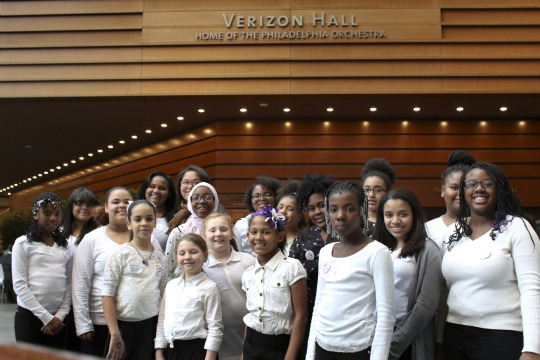Girl Power & Fiscal Sponsorship: An Interview with Alysia Lee
NYFA talks to Alysia Lee, Founding Executive Director of Sister Cities Girlchoir
Sister Cities Girlchoir (SCG) is a choral training academy that empowers girls to invest in themselves and their communities. Under the direction of Executive Director Alysia Lee, the program uses music as a tool for transformation. Before becoming its own nonprofit at the federal level, SCG was a NYFA fiscally sponsored project. In celebration of Women’s History Month, NYFA’s Madeleine Cutrona talks to Alysia about the amazing work of SCG and the critical role that women and girls play in the arts and communities.
NYFA: When you were a young girl, who fostered your interest in music and who supported you when building a career in the arts?
AL: My dad was a lifelong singer. He was in a boychoir in West Baltimore. The choir was started by a local musician who went door-to-door looking for boys that wanted to sing. In high school, he started a male quartet singing group with his friends. They sang together all over the city and even recorded a single.
My father went on after graduation to be an Airborne Army Captain and later an elementary school teacher. And he always looked back on his musical beginnings with excitement. As an adult, he continued singing at his local church. The pure enjoyment that musical study and performance gave him was contagious.
NYFA: Your biography includes experience as a musician, artist-teacher, and work with nonprofit development. This blend seems like the perfect balance for your current work with SCG. How did you recognize your interest in working with youth and leverage your varied work experience into creating SCG? What advice can you give to other artists who are interested in starting projects associated with youth-oriented arts programming?
AL: Being the Artistic Director of Sister Cities is my dream job. Previously my work experience was segregated. At my development job, there was no room for music making. And vice versa, when in the classroom or the rehearsal hall for too long, I felt my business savvy-side begin to atrophy.
I have been singing and studying voice since I was 13. I began teaching private voice lessons and conducting choirs during my undergraduate years. That early immersion into teaching allowed me to connect teaching and learning. I found that the more I taught – the better I could learn and absorb in my own studies.
I was inspired by other social entrepreneurs, like the awesome founders of DreamYard in the Bronx. I believe we must create the organization based on the needs of the community and build a job based on our strengths and passions. I encourage artists to do the same.

NYFA: Sister Cities Girlchoir (SCG) launched in September 2012 with seventy-five middle school girls. How has the scope of the project grown since that time?
AL: Since our launch in 2012, we have launched 5 school partnership programs and a Flagship Saturday program. We currently serve over 300 girls ages 6 through 16 each year. We currently operate in two states and are expanding our program to include more states in the coming years. It has been exciting to see this plan grow. I like to dream big… and start small. My goal is to have thousands of girls in our program.
NYFA: How did you first learn about about fiscal sponsorship? Why did you choose NYFA fiscal sponsorship for SCG?
AL: I learned about fiscal sponsorship in my nonprofit work. I knew that it can be a stepping stone for a new idea. I wanted time to invest in our programming and support infrastructure—and so fiscal sponsorship freed up some of our human resources to build an idea. NYFA has an excellent reputation nationally, so I wanted to be a part of this network of artists.
NYFA: SCG recently became a nonprofit at the federal level, with a 501©(3) tax status. I am curious how you determined the project was ready to end fiscal sponsorship and continue its mission as an independent organization?
AL: We always intended to use three years of fiscal sponsorship. Sometimes we were encouraged by funders or partners to speed up the process—but I really believed in the idea of taking time to build the organization slowly. We knew as a board and staff that it was time to transition because we had the proof that our idea was effective from our evaluation methods, we had established ourselves in our community, and we had three successful financial years in our pocket.

NYFA: When beginning SCG, what strategies did you use to build a network of supporters? How do you continue to nurture these relationships as a nonprofit?
AL: Partnerships are critical to our success.
SCG works collaboratively with local school communities in the target neighborhoods. SCG works with school teams comprised of administrators, music educators, parent representatives and classroom teachers to build partnerships unique to each community. Past partnerships have included hiring music teachers as SCG Teaching Artists, collaborating with arts teams for joint performances, providing professional development for classroom teachers, and providing in-school residencies for students.
SCG also aims to work collaboratively with community partners because they are critical to the success and breadth of the program’s impact. SCG partners with schools, community organizations and local government to enhance the programming, supplement the explicit social and health education offerings, sustain community linkages, and advocate for arts education. Partnering with school communities includes engagement of school music teachers, directly or indirectly. (SCG has two public school music teachers on staff currently.) SCG views school music teachers as a “first line” in reaching potential participants and advocating for arts opportunities, and a vast community and educational resource. Current partners include Rutgers Camden University, Cooper Medical School, The Kimmel Center, Education Department, and Philadelphia Music for All Youth.
SCG also aims to work collaboratively with local music organizations. These partnerships provide unique access to professional artists and their work. The partnerships with Opera Philadelphia, Walnut Street Theater, The Kimmel Center, and Broadway Dreams have yielded side-by-side performances, special invitations to perform on professional stages, discount or free tickets to professional performances and private access to their artists.
Partnerships are relationships. They require tending and communication. And organizations are made of people. People are attracted to passion. So show them how passionate you are about your idea or your work. Make the case plain and simple that supporting you also is beneficial to them.
NYFA: What happens during a typical work day at SCG in your role as founding Executive Director?
AL: A typical work day includes a balance of choir conducting and administrative work. It is important to me to frequently be in the choir space and so I conduct three of our ensembles. I usually spend the morning doing administrative work—partnership meetings, grant writing, following up with our families about performances, etc. In the afternoon, I conduct one of my assigned Girlchoir ensembles. In the evening, I have time for my own musical practice, as I am a singer as well.

NYFA: How do you define empowerment and what strategies does SCG use to serve these goals?
AL: High-arts, low-income children are three times as likely to earn a Master’s degree than their low-arts low-income peers, reports Chorus America. Recent reports from the National Endowment for the Arts confirm that the arts are a proven tool for youth development and academic success, and the benefits are even stronger for at-risk youth.
SCG programming targets academic failure, juvenile delinquency, adolescent pregnancy, and civic disengagement as key factors in the transmission of chronic poverty. The World Bank’s 2012 World Development Report recommends girl-specific youth interventions, like SCG to stop the transmission of poverty. Investing in girls is central to boosting development, breaking the cycle of intergenerational poverty, and allowing girls, and then women—51.4 percent of the population—to lead better, fairer and more productive lives. To multiply the benefits for participants, SCG combines two powerful, research-based strategies for positive youth development and poverty intervention, innovatively utilizing components of the Girl Effect and El Sistema to offer services tailored to the needs low-income urban communities.
When a girl completes her education, learns healthy habits, and builds new skills, she is more likely to delay pregnancy until adulthood, have fewer and healthier children, and earn a higher income. When given the chance to grow into a woman and become an educated mother, an economic asset, an ambitious entrepreneur, or a prepared employee, she breaks the cycle of poverty for herself and sets new preventative factors in place for the approaching generation of children in her family and /or her community. This powerful strategy is dubbed the Girl Effect—the powerful social and economic change brought about when girls have the opportunity to participate.
Additionally, El Sistema, the Venezuelan music for social change program is a robust approach for positive youth development specifically for children from low-income communities. In Venezuela, they have built over 500 music schools across the country, where 400,000 children, most of them living below the poverty line, are learning to play and sing together. Sistema is designed to cultivate social change and nurture promising futures in underserved communities through an intensive, ensemble-focused music education.
The long-term impact of SCG is to stop the intergenerational poverty for youth participants. Armed with the capital of a complete education, a supportive social network, resilience, leadership skills, and healthy habits, SCG participants will traverse the gaps that children from low-income families experience and break the cycle of poverty. The girls will grow to become women that are valuable contributors to the region. They will establish a greater number of protective factors against risk behavior for their own families, compete in a 21st century workplace with full competence, and be civically engaged in their communities. On-time high school graduation, high-risk behavior abstinence, civic engagement, and a positive self-concept are the medium-term benchmarks towards the ultimate goal of eradicating chronic poverty in youth participants.
Learn more about Sister Cities Girlchoir here. NYFA’s Fiscal Sponsorship program works with artists and emerging organizations to raise funds using NYFA’s tax-exempt status as a 501©(3)-classified organization.
– Interview by Madeleine Cutrona, Program Assistant, Fiscal Sponsorship
Images, from top: Girls gather with Sister Cities Girlchoir Founder, Alysia Lee backstage before a performance; Sister Cities Girlchoir before a culminating performance at their Annual Overnight Summer Camp in partnership with El Sistema New Jersey; Girls from a few Big Sister Girlchoirs (ages 11-16) unite for a performance at The Kimmel Center in Philadelphia; Girls from a few of the Little Sister Girlchoirs (ages 6-10) unite for a performance at the New Jersey Performing Arts Center; All images courtesy of Sister Cities Girlchoir.





